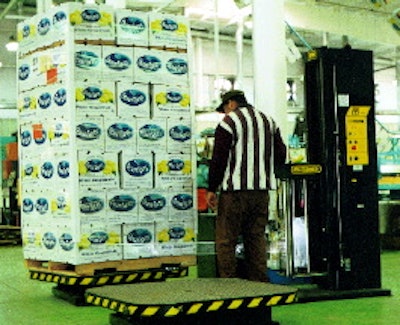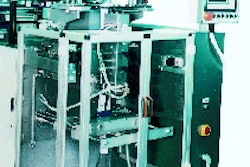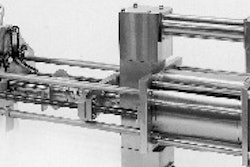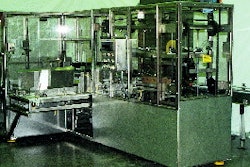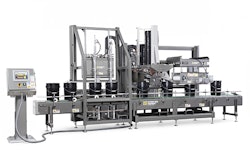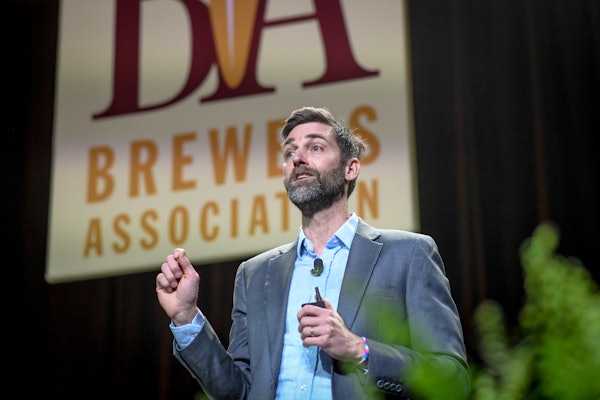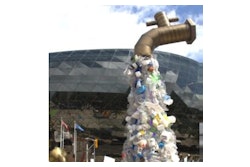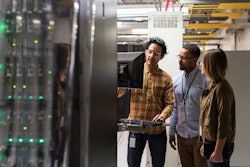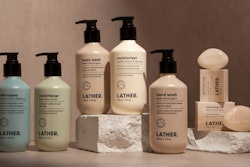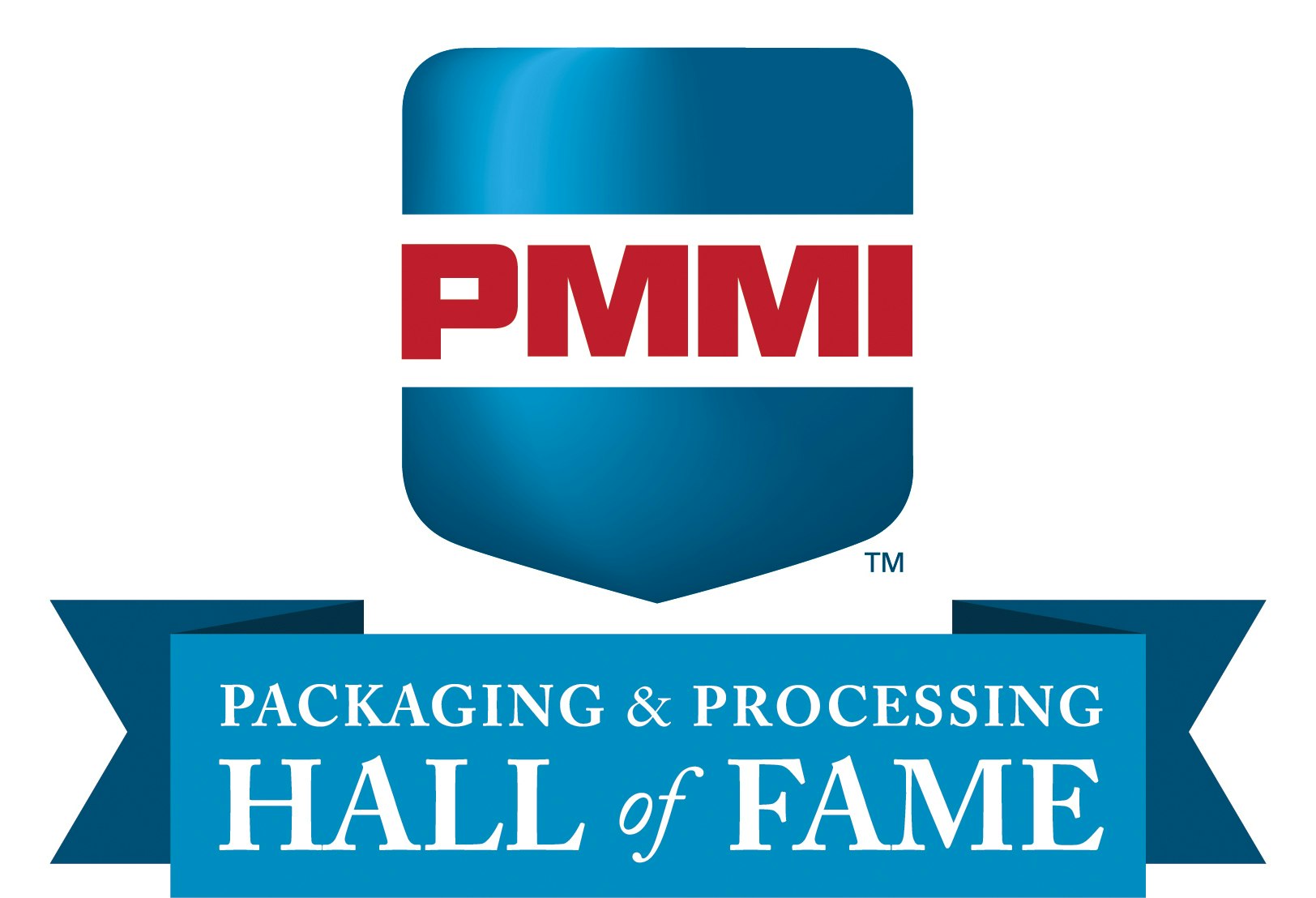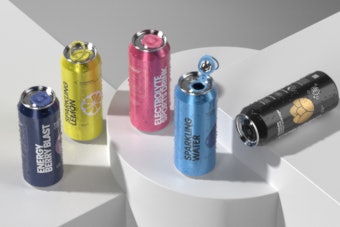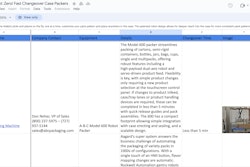A dual-turntable semi-automatic stretch wrapper for pallet loads is just one modern technology employed by Callery Judge Groves, Loxahatchee, FL, when it opened its first packinghouse last fall. Computers and vision systems control much of the fruit grading processes in this state-of-the-art plant. No matter how good and consistent the fruit selection process, the company recognized, the customer wouldn't receive a premium product unless control was exercised in building and protecting the fruit in distribution. "Many fruit packers ask 'Why should we stretch wrap the loads? The market simply doesn't demand it,'" reports Nat Roberts, plant manager and the project engineer for the packinghouse. "At Callery Judge our philosophy is to provide a higher quality product that by its very nature will command a premium price. One way to do that is to provide a load that looks as good at the end of its trip as it did at the beginning." Callery Judge is a major citrus grower with some 4ꯠ acres in production. About three years ago, the company realized that it was not in its best interests to just grow and harvest fruits that other companies packed for them. "We were doing all the tough work," Roberts recalls. So he and his staff spent about two years planning the packinghouse. He visited the country's most modern plants that pack perishables, both citrus and other fruits, many on the West Coast and in the Pacific Northwest. Eventually, the company teamed up with an engineering firm that had been involved in several of the modern plants that Roberts liked best. Along the way, Roberts had seen pallet load stretch wrapping using equipment from International Packaging Machines (Naples, FL) that was specified for the new packinghouse. Callery Judge selected a Model D88UTS30F stretch wrapper that includes IPM's Uni-Tension pre-stretch film delivery system, a roper/bander attachment and a Hi-Slide telescoping mast extension for tall loads. The machine is also equipped with a sensor eye that automatically detects load heights. Probably the most important feature of this wrapper is that it employs two turntables, so one load can be wrapped while another load is being readied on the second turntable. This permits the kind of output the company needed. Depending on the fruit and the packing patterns, as many as 200 pallet loads will be produced and shipped or warehoused each day. Computerized--in part Along with the stretch wrapper, what makes the Callery Judge operation so modern is that, where possible, most operations are controlled by computers. "We've got electronic fruit sorters that give us tremendous quality control," Roberts says. "Our system uses digital cameras that measure each individual piece of fruit for dimensions, color and weight. We can correlate those three measurements any way we want to via computers." Callery Judge is an affiliate of Ocean Spray, and much of its grapefruit is packed under the Ocean Spray label. Along with several grapefruit varieties, the company also harvests and packs 16 other varieties of citrus fruits. It's this wide variety of fruits and brands that requires packing and palletizing to be manual operations. At the packing stations, however, computer terminals identify all the specifications for the workers responsible for loading fruit into boxes. The computer spells out the type of fruit, size, brand, packing pattern and the size of box. And the terminal communicates all this in three languages: English, Spanish and Creole, a language understood by some workers who have emigrated from Haiti, points out Don Carrera, assistant plant manager. Labels that include bar codes are printed out and manually affixed to the completed box. As the box is conveyed toward the palletizing area, the bar code is scanned. A computer translates the code and directs ink-jet coders to print any additional information that's required on the box. "The computer even tracks which packing station loaded the box, and which shipping lots had which products in them," reports Roberts. Diverse markets With boxes identified with bar codes that are scanned in-line, it would seem natural that a programmable automatic palletizer would be next in line. But Roberts says that the marketing needs are so diverse the company could not find a palletizer flexible enough to handle all the loads that Callery Judge produces. Similarly, the IPM stretch wrapper is semi-automatic, rather than fully automatic. When a load is positioned on one of the two turntables, the operator affixes the leading edge of film to the load before activating the wrapper. When wrapping is complete, the film is cut from the load before the load is taken by forklift into a waiting trailer or into the house's refrigerated storage. Some loads, especially those for export, are not just stretch- wrapped. They're also secured with corrugated corner posts that are held in place by the stretch wrap. This is another reason why an automatic wrapper wouldn't be practical. The company ships throughout North America, and its exports go primarily to England, continental Europe and Japan. Taiwan is another market the company is evaluating. Last year, when Callery Judge fruits were packed by others, the typical load was secured by having just one or two of several tiers that were tied off with either twine or with tape, points out Carrera. In fact, many plants still use this technique, he says, because they can't justify the cost of the machinery and film. Roping has advantages Because it's important to get good air circulation throughout the load, especially once it's refrigerated, Callery Judge elected to use the IPM roping attachment that reduces the film width from the standard 20" roll down to a 4" band. By securing the load with widely spaced bands of "rope," air easily permeates the load so that interior boxes can be kept at optimal temperatures. Roping also gives the company two other advantages. "Tightening the film down into a band allows us to prestretch the film more than we could without roping," says Roberts. That helps to make stretch wrapping more economical. Currently, the plant uses 200% prestretching with the Uni-Tension film delivery system. Roberts declines to identify the type or source of the film he uses. He admits the company has changed the film twice in less than a year of operation. In addition, the use of film roping permits the company to check on fruit and pack quality even after the loads have been wrapped and refrigerated. "We can do selective checking of the cartons of fruit," says Roberts. "With the roping, we can more easily pull out a box or two to ensure the quality of the fruit and our packing," he says. "We can then replace the carton without affecting the security of the load." Finally, Carrera is convinced that the stretch-wrapped loads have reduced damage in transit and the resulting claims from customers. However, there's really no way to quantify this since Callery Judge never packed or shipped loads before the new packinghouse and the stretch wrapper were used. "We're confident that the stretch- wrapped load is tighter and more secure than one with just a couple of tiers tied with twine," Carrera says, "And our customers have been very satisfied with this improved unitizing technique." "We take great pride when other packinghouses complain that they can't palletize fruit as well as we do because it costs too much," concludes Roberts. "Our system is very cost-effective, and it gives us a strong competitive advantage. I believe there's a lot of elegance in simple things."
